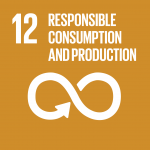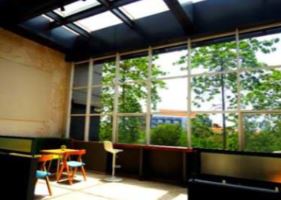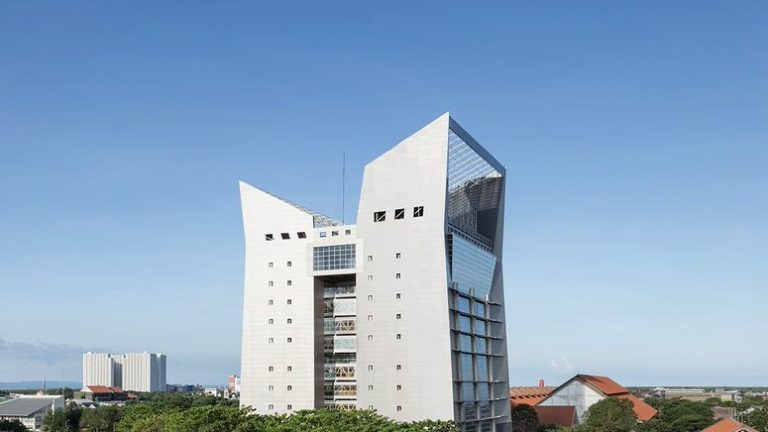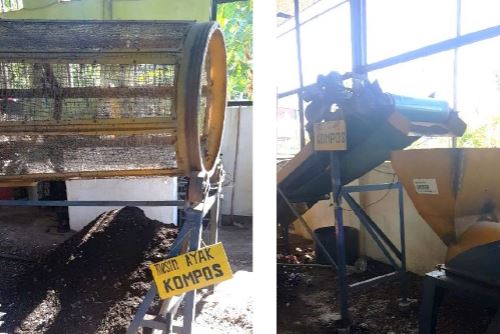“Much of the world’s economy is based around producing things for consumption. This drives the engine of industry. If we want the world to develop sustainably, we need to understand how to be more responsible at both ends of this cycle. This means promoting resource and energy efficiency, having a sustainable infrastructure, and providing access to basic services for all.”
(THE Impact Rankings)
SDG 12: RESPONSIBLE CONSUMPTION AND PRODUCTION
Operational Measures
Rector’s Regulation of Institut Teknologi Sepuluh November No. 1 Year 2022 on Procurement of Goods and Services of Non-Tax State Revenue Funds
Procurement of Institut Teknologi Sepuluh Nopember (ITS) Goods / Services is an activity to obtain Goods / Services by ITS whose implementation is carried out in an integrated manner, starting from planning needs until the completion of all activities to obtaining Goods / Services. ITS Non-Tax State Revenue Fund are funds obtained by ITS from service activities organized services from the use of intangible assets owned by ITS. While services are organized from the use of intangible assets owned by ITS by other parties, sales of goods and/or from the benefits of investments made by ITS, or donations, funds made by ITS, or donations, grants, or loans from outside parties to ITS. Furthermore, procurement ethics are set out in Chapter III, Section Two, Page 7.
Rector Statement Letter to ITS’ Commitment on Achieving Sustainable Development Goals (SDGs)
Institut Teknologi Sepuluh Nopember, with its “Advancing Humanity” motto, commits to achieving SDGs by becoming a sustainable and environmentally friendly campus. The commitment is shown by establishing the Rector’s Statement Letter in achieving the Sustainable Development Goals. Moreover, discussions related to ethical food and supplies (reducing the consumption of disposable materials/containers, providing clean and healthy canteens, and several other points) can be found in Chapter III, Environment Pages 2-4.
Hazardous Waste Treatment
Institut Teknologi Sepuluh Nopember (ITS) is committed to its efforts to manage waste containing hazardous and toxic materials (B3). At ITS, Hazardous and Toxic Waste (B3) is partially handled 50-75% separately by classifying, collecting, and submitting it to third parties who are certified.
Rector Statement Letter to ITS’ Commitment on Achieving Sustainable Development Goals (SDGs)
Institut Teknologi Sepuluh Nopember, with its “Advancing Humanity” motto, commits to achieving SDGs by becoming a sustainable and environmentally friendly campus. The commitment is shown by establishing the Rector’s Statement Letter in achieving the Sustainable Development Goals. Moreover, discussions related to the process or practice of waste disposal covering hazardous materials can be found in Chapter III, Point E, Page 3.
Waste Disposal Management
The processing of Institut Teknologi Sepuluh Nopember (ITS) organic waste in the form of street sweeping leaves and twigs is further processed at the ITS Compost House located on Jl Arif Rahman Hakim. Waste generated every day amounted to ± 3.5 – 4 m3 and produced approximately 90 kg of compost. Furthermore, ITS has a biogas reactor placed at the Sutorejo Surabaya Superdepo TPS. The biogas plant is equipped with purification and placed adjacent to the final catchment basin for organic waste. This reactor processes organic waste from the landfill of 0.5 tons per day.
Rector Statement Letter to ITS’ Commitment on Achieving Sustainable Development Goals (SDGs)
Institut Teknologi Sepuluh Nopember, with its “Advancing Humanity” motto, is committed to contributing to achieving SDGs by becoming a sustainable and environmentally friendly campus. The commitment is shown by establishing the Rector’s Statement Letter in achieving the Sustainable Development Goals. Moreover, discussions related to waste disposal, measuring the amount of waste sent to landfill and recycled, can be found in Chapter III, Point B, C, and D, Page 2.
Rector Statement Letter to ITS’ Commitment on Achieving Sustainable Development Goals (SDGs)
Institut Teknologi Sepuluh Nopember (ITS) is committed to reducing the use of plastic within the ITS Campus area is shown by the establishment of the Rector’s Statement Letter in achieving the Sustainable Development Goals Chapter III, Point F, Page 3.
Circular Letter No. B/5026B/IT2/TU.00.02/2019 concerning the Use of Disposable Plastic Drinking Water Packaging and Plastic Bags in the ITS Environment
Institut Teknologi Sepuluh Nopember (ITS) commits to the ban on the use of single-use plastic drinking water packaging and plastic bags, as shown by the establishment of Circular Letter No. B/5026B/IT2/TU.00.02/2019 concerning the Use of Disposable Plastic Drinking Water Packaging and Plastic Bags in the ITS Environment.
Rector Statement Letter to ITS’ Commitment on Achieving Sustainable Development Goals (SDGs)
Institut Teknologi Sepuluh Nopember (ITS)is committed to minimizing disposable items within the ITS Campus area is shown by establishing the Rector’s Statement Letter in achieving the Sustainable Development Goals Chapter III, Point F and M, Page 3.
Circular Letter No. B/5026B/IT2/TU.00.02/2019 concerning the Use of Disposable Plastic Drinking Water Packaging and Plastic Bags in the ITS Environment
Institut Teknologi Sepuluh Nopember (ITS) commits to to minimize disposable items, as shown by the establishment of Circular Letter No. B/5026B/IT2/TU.00.02/2019 concerning the Use of Disposable Plastic Drinking Water Packaging and Plastic Bags in the ITS Environment.
Rector Statement Letter to ITS’ Commitment on Achieving Sustainable Development Goals (SDGs)
Institut Teknologi Sepuluh Nopember (ITS) has implemented rigorous standards when choosing suppliers, emphasizing those with acknowledged sustainable policies and certifications. Our dedication to sustainability extends to collaborating with industries engaged in eco-friendly procurement practices. To lessen our environmental impact, we limit the consumption of paper, cards, printer inks, and other materials harmful to the environment. Those commitments are shown by establishing the Rector’s Statement Letter in achieving the Sustainable Development Goals Chapter III, Point F and M, Page 3.
Circular Letter No. B/5026B/IT2/TU.00.02/2019 concerning the Use of Disposable Plastic Drinking Water Packaging and Plastic Bags in the ITS Environment
Institut Teknologi Sepuluh Nopember (ITS) commits to minimizing disposable items, as shown by establishing Circular Letter No. B/5026B/IT2/TU.00.02/2019 concerning the Use of Disposable Plastic Drinking Water Packaging and Plastic Bags in the ITS Environment. Furthermore, leaders and work units are asked to support the commitment by preventing outsiders from bringing single-use plastic drinking water packaging and/or plastic bags into the ITS environment.
Rector’s Regulation of Institut Teknologi Sepuluh November No. 1 Year 2022 on Procurement of Goods and Services of Non-Tax State Revenue Funds
Procurement of Institut Teknologi Sepuluh Nopember (ITS) Goods / Services is an activity to obtain Goods / Services by ITS whose implementation is carried out in an integrated manner, starting from planning needs until the completion of all activities to obtaining Goods / Services. Furthermore, extends to outsourced services and the supply chain are set out in Chapters IV, VII, and VIII regarding implementing Goods/Services Procurement and Chapter IX, Use of Domestically Produced Goods/Services, Page 43-44.
Rector Statement Letter to ITS’ Commitment on Achieving Sustainable Development Goals (SDGs)
Institut Teknologi Sepuluh Nopember (ITS) has implemented rigorous standards when choosing suppliers, emphasizing those with acknowledged sustainable policies and certifications. Our dedication to sustainability extends to collaborating with industries engaged in eco-friendly procurement practices. To lessen our environmental impact, we limit the consumption of paper, cards, printer inks, and other materials harmful to the environment. Those commitments are shown by establishing the Rector’s Statement Letter in achieving the Sustainable Development Goals Chapter III, Point F and M, Page 3.
Circular Letter No. B/5026B/IT2/TU.00.02/2019 concerning the Use of Disposable Plastic Drinking Water Packaging and Plastic Bags in the ITS Environment
Institut Teknologi Sepuluh Nopember (ITS) commits to minimizing disposable items, as shown by establishing Circular Letter No. B/5026B/IT2/TU.00.02/2019 concerning the Use of Disposable Plastic Drinking Water Packaging and Plastic Bags in the ITS Environment. Furthermore, leaders and work units are asked to support the commitment by preventing outsiders from bringing single-use plastic drinking water packaging and/or plastic bags into the ITS environment.
Rector’s Regulation of Institut Teknologi Sepuluh November No. 1 Year 2022 on Procurement of Goods and Services of Non-Tax State Revenue Funds
Procurement of Institut Teknologi Sepuluh Nopember (ITS) Goods / Services is an activity to obtain Goods / Services by ITS whose implementation is carried out in an integrated manner, starting from planning needs until the completion of all activities to obtaining Goods / Services. Furthermore, extends to outsourced services and the supply chain (suppliers of equipment, stationary, building contracts) are set out in Chapters IV, VII, and VIII regarding the Implementation of Goods/Services Procurement and Chapter IX, Use of Domestically Produced Goods/Services, Page 43-44.
Proportion of Recycled Waste
Waste and Garbage Management at ITS
The waste recycling program on the ITS campus currently has reached more than 50% of the total waste. The activities carried out are the separation of trash at the source of waste, the implementation of waste management with the 3R concept (Reduce, Reuse and Recycle) in all units is an ITS policy stated in the unit performance contract, formation of a waste bank through ITS Integrated Waste Savings (TaSTe) for all of ITS Civitas Academica, and independent waste bank activities or programs pursued by ITS student organizations.
Sustainability Aspects of Waste at ITS
Waste management at ITS is divided into several programs, including waste recycling, paper and plastic reduction, organic and inorganic waste treatment, and waste and wastewater management. Further discussion can be found in Chapter 3, “Waste”, pages 16-25.
Publication of a Sustainability Report
SDG 12 IN NUMBERS
728 metric ton
Amount of Waste Generated
104 metric ton
Amount of Waste Recycled
520 metric ton
Amount of waste sent to landfill




